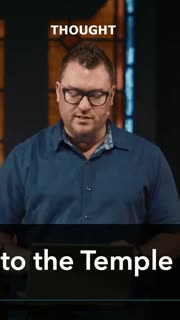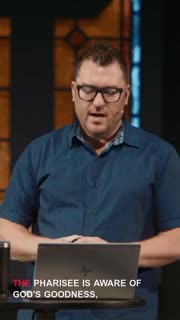Embracing Humility and God's Expansive Grace
Devotional
Sermon Summary
Bible Study Guide
Sermon Clips
### Quotes for Outreach
1. "When you enter wherever, it is unlikely that he will call you on your mobile. Thank you for turning off your phones. If you want to talk to God, enter, choose a quiet place, and talk to him. If you want to see him, send him a text while driving." [29:21] (18 seconds)
2. "Jesus was a master storyteller. He, I'm guessing in Aramaic, it didn't come out as once upon a time, but he told these made-up stories. We call them parables. Several of them, several of them, they're called parables. They're called parables. Several of them have been written down for us in the Bible." [30:49] (13 seconds)
3. "The self-righteous thought that he was justified and he was not. And it was the sinner who was justified. The self-righteous, as Jesus said in other places, the self-righteous had the praise of man, he already got his reward. And so, our application is, be careful, of pride or self-righteousness. Works cannot save us. Humble yourself, recognize your sinfulness compared to God, and then and only then will you be justified." [01:03:17] (26 seconds)
4. "God's grace and mercy is likely bigger and wider than we expect, possibly even more than we are comfortable with. And so for those of you who look at, on a Sunday, look at people dressed differently, maybe you're a casual dresser and you look at the suits or you're a suit and you're looking at the casual dressers and there's this feeling of disdain. Or more likely, together we are the good and we look at those people, we create the us and the them, and they are the problem." [01:16:09] (30 seconds)
5. "If you happen to be in a place where, whether externally or internally, things are falling apart, you know, your prayer is simple. God, be merciful to me, a sinner. There's mercies that are new every morning. There's grace that is greater than all our sin. When we are faithless, he is faithful. He will never leave you nor forsake you. Anchor yourself in the grace and the mercy of God." [01:25:49] (22 seconds)
### Quotes for Members
1. "When you have a master storyteller, they can tell a story that when you move it to a new time or a new context, it lands differently because of who you are or how you're reading it. An example we used a little while ago, we did the story of the man who has two sons, or we also often call the prodigal son. And how when different contexts hear that story, they say that the major issue is something different." [31:55] (23 seconds)
2. "If the Pharisee made any mistake, in his prayer, it was when he basically pushed God aside. And again, I'm assuming here, I'm not ready to say that's what he did, but it is one interpretation. And he said, I thank you that I, now he sits in the judge's seat, I don't sin. I don't commit adultery. I don't, I'm not like that tax collector. I fast twice a week. I give you a tenth of everything I have. Like, look at, look at me and look at all those people who don't, who don't measure up." [44:28] (27 seconds)
3. "The Pharisee is aware of God's goodness, and it is evident in his life. He is thankful to God for these things, and so he appropriately celebrates the good things God has brought into his life and allowed him to do. Just like we did today in our prayer, just like we did last week in our sermon, totally normal, totally acceptable. If he is to be faulted, it is because he judged others who, for whatever reason, have not lived a similar life." [01:07:20] (28 seconds)
4. "Perhaps we need to benefit from other people's goodness such as Jesus, the gospel. More likely since we're in church, God is doing good things in our life, we might simply need to be thankful for mercy and grace and not take the role of determining who should get it and who shouldn't. And why. That's God's seat. That's God's role. Do your best. Trust God with the rest. He is on a mission to reconcile worshipers from everywhere." [01:15:37] (28 seconds)
5. "If God's grace is evident in your life and really, like, it's going fairly well, all things considered, thank him. Thank him that you are able to live in such a way. It's his grace. we know the opposite. There but for the grace of God go I." [01:25:49] (17 seconds)
Ask a question about this sermon
1. "When you enter wherever, it is unlikely that he will call you on your mobile. Thank you for turning off your phones. If you want to talk to God, enter, choose a quiet place, and talk to him. If you want to see him, send him a text while driving." [29:21] (18 seconds)
2. "Jesus was a master storyteller. He, I'm guessing in Aramaic, it didn't come out as once upon a time, but he told these made-up stories. We call them parables. Several of them, several of them, they're called parables. They're called parables. Several of them have been written down for us in the Bible." [30:49] (13 seconds)
3. "The self-righteous thought that he was justified and he was not. And it was the sinner who was justified. The self-righteous, as Jesus said in other places, the self-righteous had the praise of man, he already got his reward. And so, our application is, be careful, of pride or self-righteousness. Works cannot save us. Humble yourself, recognize your sinfulness compared to God, and then and only then will you be justified." [01:03:17] (26 seconds)
4. "God's grace and mercy is likely bigger and wider than we expect, possibly even more than we are comfortable with. And so for those of you who look at, on a Sunday, look at people dressed differently, maybe you're a casual dresser and you look at the suits or you're a suit and you're looking at the casual dressers and there's this feeling of disdain. Or more likely, together we are the good and we look at those people, we create the us and the them, and they are the problem." [01:16:09] (30 seconds)
5. "If you happen to be in a place where, whether externally or internally, things are falling apart, you know, your prayer is simple. God, be merciful to me, a sinner. There's mercies that are new every morning. There's grace that is greater than all our sin. When we are faithless, he is faithful. He will never leave you nor forsake you. Anchor yourself in the grace and the mercy of God." [01:25:49] (22 seconds)
### Quotes for Members
1. "When you have a master storyteller, they can tell a story that when you move it to a new time or a new context, it lands differently because of who you are or how you're reading it. An example we used a little while ago, we did the story of the man who has two sons, or we also often call the prodigal son. And how when different contexts hear that story, they say that the major issue is something different." [31:55] (23 seconds)
2. "If the Pharisee made any mistake, in his prayer, it was when he basically pushed God aside. And again, I'm assuming here, I'm not ready to say that's what he did, but it is one interpretation. And he said, I thank you that I, now he sits in the judge's seat, I don't sin. I don't commit adultery. I don't, I'm not like that tax collector. I fast twice a week. I give you a tenth of everything I have. Like, look at, look at me and look at all those people who don't, who don't measure up." [44:28] (27 seconds)
3. "The Pharisee is aware of God's goodness, and it is evident in his life. He is thankful to God for these things, and so he appropriately celebrates the good things God has brought into his life and allowed him to do. Just like we did today in our prayer, just like we did last week in our sermon, totally normal, totally acceptable. If he is to be faulted, it is because he judged others who, for whatever reason, have not lived a similar life." [01:07:20] (28 seconds)
4. "Perhaps we need to benefit from other people's goodness such as Jesus, the gospel. More likely since we're in church, God is doing good things in our life, we might simply need to be thankful for mercy and grace and not take the role of determining who should get it and who shouldn't. And why. That's God's seat. That's God's role. Do your best. Trust God with the rest. He is on a mission to reconcile worshipers from everywhere." [01:15:37] (28 seconds)
5. "If God's grace is evident in your life and really, like, it's going fairly well, all things considered, thank him. Thank him that you are able to live in such a way. It's his grace. we know the opposite. There but for the grace of God go I." [01:25:49] (17 seconds)










